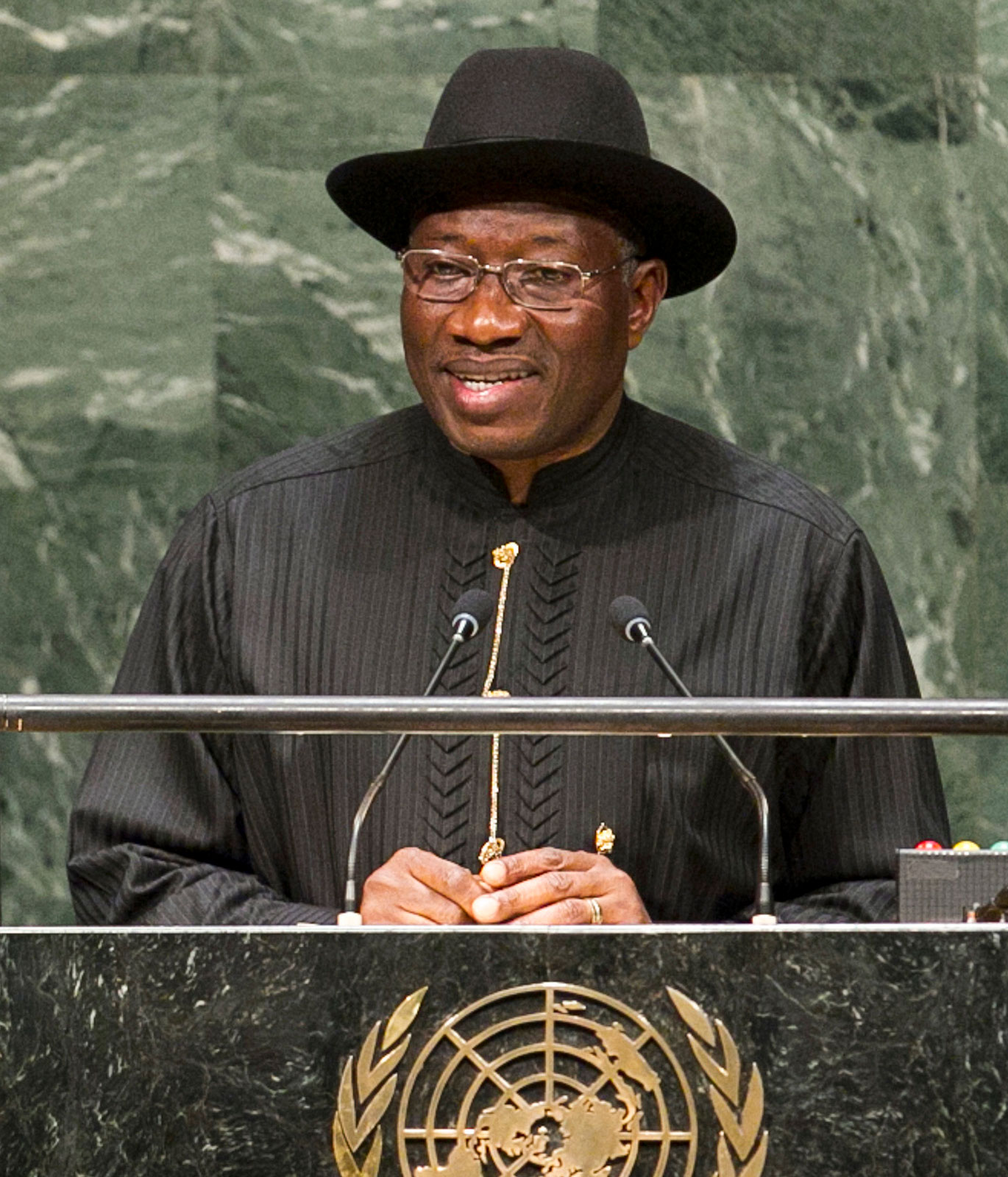Headline
Nigera Founding Fathers Should Be Blamed For Poor Job – Jonathan

Former President Goodluck Jonathan, has said while Nigeria’s founding fathers deserve credit for the struggle for independence and victory which followed, they should share in the blame for doing a poor job at nation building subsequently.
Jonathan said this in his remarks during a national dialogue and public presentation of 21 books, held in honour of Prof. Udenta Udenta, as part of activities to mark his 60th birthday, in Abuja, on Tuesday.
The former Nigerian leader who served as chairman of the occasion, likened the celebrant who authored all of the 21 books to former Tanzanain president, Julius Nyerere, whom he said championed Tanzanaian nationhood.
He said unlike Nyerere; Nigerian founding fathers paid greater emphasis on ethnic and identity politics at the expense of building Nigeria into a cohesive nation.
READ ALSO: NLC Two Days Warning Strike Paralyzes Activities In Edo
Jonathan said, “Have we been able to convince ourselves whether we are a state or a nation? If we are a country and a state, how do we become a nation?
“I am not blaming our founding fathers but they failed to integrate us into a proper nation. They operated as individuals and so on.
“Of course, if you have read some of the comments of our former leaders, someone like (Obafemi) Awolowo made it very clear that there was no nation called Nigeria. That it is a geographical entity, it is a country, it is a state, it has laws but there is no nation.
“The country was so polarized especially during the early political party formation and the parties were regional parties.
“There was no sense of commitment to integrate Nigeria into an entity that you can say yes, this is a nation with core values, common philosophy and people will be patriotic to that nation.
READ ALSO: Why We Protested Against Jonathan’s Subsidy Removal In 2012
“Most of the parties that time belonged to regions and there were no alliances for the purpose of ruling the country.
“When I compare Nigeria and a country like Tanzania, I feel that Julius Nyerere made his vision clear to make Tanzania a nation. They have different tribes, maybe not as many as Nigeria but one nation was at the height of his thoughts.”
The Nigerian President explained that like Nigeria, Tanzania is made up predominantly of Muslims and Chirstians.
He further stated that in spite of the numerical strength and popularity of the two faiths, President Nyerere was able to champion a one party state to prevent political parties dissolving into their ethnic and religious cocoons as he worked hard with other nationalists to build Tanzania into the nation is has become.
Jonathan said, “He (Nyerere) made sure that every person from Tanzania speaks that (one) language, those who go to primary, secondary and tertiary schools quickly adhered to this as Nyerere made education compulsory.
READ ALSO: Jonathan Meets Tinubu At Presidential Villa
“So, you hardly see somebody who didn’t get at least basic knowledge of the language in what we call the first nine years of school education. At that level, you communicate in Swahili.”
Ex-President Jonathan recalled that his modest attempt at nation building was the driving force behind the 2014 national conference which was designed to addressed some of the fault lines that have kept Nigerians apart.
He expressed confidence that if the recommendations of the 2014 conference were not only adopted but implemented, “We will not say we have a country called Nigeria, we will not say we have a state called Nigeria, we will also say we have a nation called Nigeria.”
Former Ministet of Solid Minerals and Ex-Ekiti State Governor, Kayode Fayemi, a Cheiftain of the ruling All Progressives Congress, in his remarks confessed that although President Jonathan was right in his attempt to remove fuel subsidies, the opposition Action Congress of Nigeria, ACN, which he (Fayemi) was part of mobilised Nigerians against it for political reasons.
He said the ‘Occupy Nigeria’ protest which grounded the country was part of strategies employed by the opposition to make the ruling PDP unpopular. He describe the antics of the opposition then as part of politics.
READ ALSO: Jonathan Bags Democracy Icon Award In Kigali, Charges Leaders To Prioritise Service
Fayemi said, “Today, I read former president Olusegun Obasanjo’s interview saying our liberal democracy is not working and we need to revisit it. And I agree with him that we must move to a political alternative. I think we are almost at a dead end.
“What we need is alternative politics and my own notion of alternative politics is that you can’t have 35 per cent of the vote and take 100 per cent of the spoil. It won’t work.
“We must look at proportional representation so that the party that is said to have 21 per cent of the vote will have 21 per cent representation in government. Adversaries politics bring division and enmity.
“All political parties in the country agreed and even put in their manifestos that subsidy must be removed. We all said subsidy must be removed. But we in ACN at the time in 2012, we knew it was all politics.
“That is why we must ensure that everybody is a crucial stakeholder by stopping all these. Put the manifesto of PDP, APC, Labour Party on the table and select all those who will pilot the programme from all parties.”
Nigerians will recall that on January 1, 2012, then President Goodluck Jonathan announced the removal of fuel subsidy.
READ ALSO: Jonathan Arrives Freetown Ahead Of Saturday’s General Election In Sierra Leone
This action led to the adjustment of the pump price of petrol from N65 per litre to N141 the decision sparked mass protests across Nigeria with the economy taking a hit. The administration was literally forced to recind the decision by replacing subsidies and reducing the pump price.
Fayemi equally faulted what he described as Nigeria’ politics of the winner-takes-all. He suggested that all political parties should
be made to place their manifestos on the table for a consensus to be built while an all inclusive system should be built in such a way that parties will find a place in government at the end of elections depending on their performance at the polls.
He equally credited the Jonathan administration for making giant strides in developing Nigeria’s economy. According to him, the last time Nigeria enjoyed economic growth was during his administration.
Also speaking during the event, former Minister of Aviation and a chieftain of the PDP, Osita Chidoka, said as the nation awaits the judgement of the Presidential Election Petition Court on Wednesday, parties should prepare to accept the outcome.
Specifically, the PDP Cheiftain advised President Ahmed Bola Tinubu to be prepared to relocate to Lagos and prepare for the 2027 general elections if he loses at the court.
Chidoka said, “If the court says Tinubu is no longer the President, he should pack his things and go to Lagos and prepare for the next election. If they say he is the president, we will continue our agitation for the reform of the electoral management system.”
VANGUARD
Headline
South Korea, Japan Protest China, Russia Aircraft Incursions

South Korea and Japan reacted furiously on Wednesday after Chinese and Russian military aircraft conducted joint patrols around the two countries, with both Seoul and Tokyo scrambling jets.
South Korea said it had protested with representatives of China and Russia, while Japan said it had conveyed its “serious concerns” over national security.
According to Tokyo, two Russian Tu-95 nuclear-capable bombers on Tuesday flew from the Sea of Japan to rendezvous with two Chinese H-6 bombers in the East China Sea, then conducted a joint flight around the country.
The incident comes as Japan is locked in a dispute with China over comments Prime Minister Sanae Takaichi made about Taiwan.
READ ALSO:China Backs Nigeria, Warns Against Foreign Interference
The bombers’ joint flights were “clearly intended as a show of force against our nation, Defence Minister Shinjiro Koizumi wrote on X Wednesday.
Top government spokesman Minoru Kihara said that Tokyo had “conveyed to both China and Russia our serious concerns over our national security through diplomatic channels”.
Seoul said Tuesday the Russian and Chinese warplanes entered its air defence zone and that a complaint had been lodged with the defence attaches of both countries in the South Korean capital.
“Our military will continue to respond actively to the activities of neighbouring countries’ aircraft within the KADIZ in compliance with international law,” said Lee Kwang-suk, director general of the International Policy Bureau at Seoul’s defence ministry, referring to the Korea Air Defence Identification Zone.
READ ALSO:Trial For South Korean Woman Accused Of ‘Suitcase Murders’ Starts Today
South Korea also said it deployed “fighter jets to take tactical measures in preparation for any contingencies” in response to the Chinese and Russian incursion into the KADIZ.
The planes were spotted before they entered the air defence identification zone, defined as a broader area in which countries police aircraft for security reasons but which does not constitute their airspace.
Japan’s defence ministry also scrambled fighter jets to intercept the warplanes.
Beijing later Tuesday confirmed it had organised drills with Russia’s military according to “annual cooperation plans”.
READ ALSO:South Korean Actress Kim Sae-ron Found Dead In Seoul Apartment
Moscow also described it as a routine exercise, saying it lasted eight hours and that some foreign fighter jets followed the Russian and Chinese aircraft.
Since 2019, China and Russia have regularly flown military aircraft into South Korea’s air defence zone without prior notice, citing joint exercises.
In November last year, Seoul scrambled jets as five Chinese and six Russian military planes flew through its air defence zone.
Similar incidents occurred in June and December 2023, and in May and November 2022.
READ ALSO:Russia Insists Ukraine Must Cede Land Or Face Continued Military Push
Meanwhile, Tokyo said Monday it had scrambled jets in response to repeated takeoff and landing exercises involving fighter jets and military helicopters from China’s Liaoning aircraft carrier as it cruised in international waters near Japan.
It also summoned Beijing’s ambassador after military aircraft from the Liaoning locked radar onto Japanese jets, the latest incident in the row ignited by Takaichi’s comments backing Taiwan.
Takaichi suggested last month that Japan would intervene militarily in any Chinese attack on the self-ruled island, which Beijing claims as its own and has not ruled out seizing by force.
AFP
Headline
Thousands Reported To Have Fled DR Congo Fighting As M23 Closes On Key City

Fierce fighting rocked the eastern Democratic Republic of Congo on Tuesday as the Rwanda-backed M23 militia rapidly advanced towards the strategic city of Uvira, with tens of thousands of people fleeing over the nearby border into Burundi, sources said.
The armed group and its Rwandan allies were just a few kilometres (miles) north of Uvira, security and military sources told AFP.
The renewed violence undermined a peace agreement brokered by US President Donald Trump that Kinshasa and Kigali signed less than a week ago, on December 4.
Trump had boasted that the Rwanda-DRC conflict was one of eight he has ended since returning to power in America in January.
READ ALSO:Ambassadorial Nominees: Ndume Asks Tinubu To Withdraw List
With the new fighting, more than 30,000 people have fled the area around Uvira for Burundi in the space of a week, a UN source and a Burundian administrative source told AFP.
The Burundian source told AFP on condition of anonymity he had recorded more than 8,000 daily arrivals over the past two days, and 30,000 arrivals in one week. A source in the UN refugee agency confirmed the figure.
The Rwanda-backed M23 offensive comes nearly a year after the group seized control of Goma and Bukavu, the two largest cities in eastern DRC, a strategic region rich in natural resources and plagued by conflict for 30 years.
Local people described a state of growing panic as bombardments struck the hills above Uvira, a city of several hundred thousand residents.
“Three bombs have just exploded in the hills. It’s every man for himself,” said one resident reached by telephone.
READ ALSO:South Africa Beat DR Congo In shootout To Finish Third At AFCON
“We are all under the beds in Uvira — that’s the reality,” another resident said, while a representative of civil society who would not give their name described fighting on the city’s outskirts.
Fighting was also reported in Runingo, another small locality some 20 kilometres (12 miles) from Uvira, as the M23 and the Rwandan army closed in.
Burundi views the prospect of Uvira falling to Rwanda-backed forces as an existential threat, given that it sits across Lake Tanganyika from Burundi’s economic capital Bujumbura.
The city is the main sizeable locality in the area yet to fall to the M23 and its capture would essentially cut off the zone from DRC control.
READ ALSO:Stampede Kills 37 During Army Recruitment In Congo Capital
Burundi deployed about 10,000 soldiers to eastern DRC in October 2023 as part of a military cooperation agreement, and security sources say reinforcements have since taken that presence to around 18,000 men.
The M23 and Rwandan forces launched their Uvira offensive on December 1.
Rich in natural resources, eastern DRC has been choked by successive conflicts for around three decades.
Violence in the region intensified early this year when M23 fighters seized the key eastern city of Goma in January, followed by Bukavu, capital of South Kivu province, a few weeks later.
– Regional risk –
The peace deal meant to quell the fighting was signed last Thursday in Washington by Congolese President Felix Tshisekedi and his Rwandan counterpart Paul Kagame, with Trump — who called it a “miracle” deal — also putting his signature to it.
READ ALSO:FULL LIST: US To Review Green Cards From 19 ‘Countries Of Concern’ After Washington Shooting
The agreement includes an economic component intended to secure US supplies of critical minerals present in the region, as America seeks to challenge China’s dominance in the sector.
But even on the day of the signing, intense fighting took place in South Kivu, where Uvira is located, which included the bombing of houses and schools.
Witnesses and military sources in Uvira said that Congolese soldiers fleeing the fighting had arrived in the city overnight Monday and shops were looted at dawn.
Several hundred Congolese and Burundian soldiers had already fled to Burundi on Monday, according to military sources, since the M23 fighters embarked on their latest offensive from Kamanyola, some 70 kilometres north of Uvira.
Since the M23’s lightning offensive early this year, the front had largely stabilised over the past nine months.
Burundian President Evariste Ndayishimiye warned in February there was a danger of the conflict escalating into a broader regional war, a fear echoed by the United Nations.
Headline
‘Santa Claus’ Arrested For Possessing, Distributing Child Sexual Abuse Material

A 64-year-old man from Hamilton Township has been arrested in the United States after investigators linked him to the possession and distribution of child sexual abuse material.
The suspect, identified as Mark Paulino, had been working as a “Santa for hire” at holiday events, a role that placed him in repeated contact with children.
Mercer County officials said the investigation began on 4 December when detectives were alerted to suspicious online activity involving the uploading of child pornography from a residence in Hamilton Township. The probe quickly identified Paulino, a retired elementary school teacher, as the person involved.
READ ALSO:Nigerian Ringleader Of Nationwide Bank Fraud, Money Laundering Jailed In US, Says FBI
Police stated that Paulino had presented himself online as a retired teacher and had recently performed as Santa Claus for photographs and private, corporate, and organisational events. “Because this role involved direct, repeated contact with children, detectives worked around the clock to secure a search warrant,” authorities explained.
The warrant was executed on 5 December, during which police seized multiple items regarded as evidentiary. Paulino was taken into custody without incident and charged with possession and distribution of child sexual abuse materials, as well as endangering the welfare of a child.
Prosecutors have filed a motion to detain him pending trial. The investigation remains ongoing, and authorities have urged members of the public with relevant information to come forward.

 News5 days ago
News5 days agoRufai Oseni Breaks Silence On Alleged Suspension From Arise TV

 Headline5 days ago
Headline5 days agoJUST IN: Soldiers Announce Military Takeover Of Govt In Benin Republic

 News5 days ago
News5 days agoOAU Unveils Seven-foot Bronze Statue Of Chief Obafemi Awolowo

 Politics3 days ago
Politics3 days agoJUST IN: Tinubu Holds Closed-door Meeting With Rivers, Ebonyi Govs

 News3 days ago
News3 days agoWhy My Lineage Qualifies Me For Awujale Throne — K1 De-Ultimate

 Politics3 days ago
Politics3 days agoTinubu, Six APC Governors Hold Closed-door Meeting At Aso Villa

 News5 days ago
News5 days agoWoman Taken For Dead Wakes Up Inside Coffin Few Minutes To Her Cremation

 Politics5 days ago
Politics5 days agoAmbassadorial Nominees: Ndume Asks Tinubu To Withdraw List

 News3 days ago
News3 days agoGroup Wants Edo AG Professorship Investigated

 News4 days ago
News4 days agoHow I and Obey’s Son Escaped Getting Caught In Benin’s Coup —Dele Momodu






























